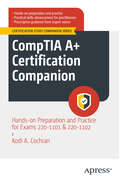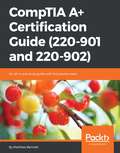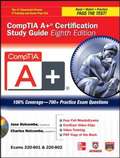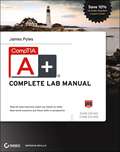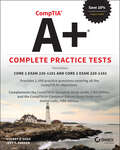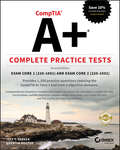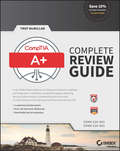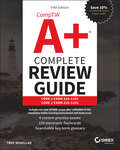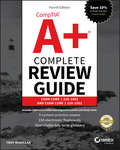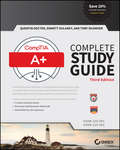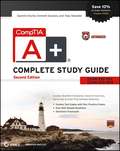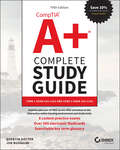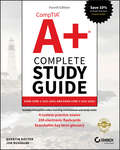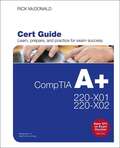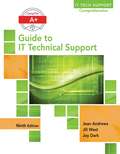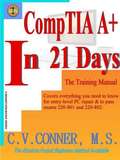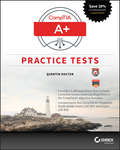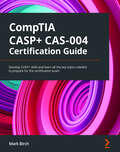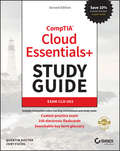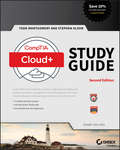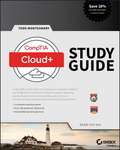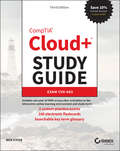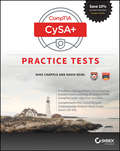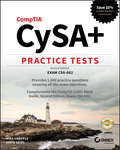- Table View
- List View
CompTIA A+ Certification Companion: Hands-on Preparation and Practice for Exams 220-1101 & 220-1102 (Certification Study Companion Series)
by Kodi A. CochranThis book covers all topics and requirements of the CompTIA A+ certification exam. It will allow readers to easily understand the concepts, information, and skills needed to obtain the associated certification. CompTIA A+ certification is at its core an entry-level certification to the information technology world, including cybersecurity. It is comprised of a set of two exams (Exams 220-1101 & 220-1102) created by IT industry professionals that validate skills needed for entry-level IT jobs, including cybersecurity. This certification stands as baseline proof of knowledge of these topics and is largely sought by recruiters. Main exam topics include hardware, networking, mobile devices, security, Windows operating system, other IOS technologies, software troubleshooting and operations procedures. This book has been designed to follow the core requirements for the full scope of the CompTIA A+ certification, covering both examination test requirements. It has been formatted to follow a logical and easy to follow order to allow a foundational level of understanding prior to moving onto more advanced topics. The book will provide all readers with the appropriate knowledge and information to have a foundational level of many Information Technology components. It will primarily serve the newer entrants to the field but will also support more experienced individuals that are looking towards certifications. What You Will Learn: Effective communication with clients and colleagues and interpersonal skills for collaboration in team environments. Understanding of motherboard components and architecture. Knowledge of CPU types and socket compatibility. Installation and configuration of operating systems. Software troubleshooting techniques. Installation and configuration of Windows, Linux, and macOS. Management of system settings and user accounts. Identification of laptop components and peripherals. Maintenance procedures for laptops, including cleaning and battery management. Configuration of mobile device settings and preferences. Understanding of mobile operating systems and app installation procedures. Troubleshooting common printer hardware and software issues. Basic networking concepts, including IP addressing and subnetting. Configuration of network devices such as routers and switches. Configuration and management of wireless access points. Implementation of wireless security protocols such as WPA2 and WPA3. Understanding of cloud service models (IaaS, PaaS, SaaS). Deployment and management of virtual machines in the cloud. Recognition of common security threats and vulnerabilities. Implementation of security best practices for data protection. Who this book is for: Anyone that is looking to get into the information technology or cybersecurity fields. This would also include academics looking to pursue bachelor’s or master’s degrees, as often programs include the A+ certification. There is no necessary prior skill experience or knowledge needed.
CompTIA A+ Certification Guide (220-901 and 220-902)
by Matthew BennettEfficiently clear CompTIA 220-901 and 220-902 certification About This Book • Your CompTIA A+ study companion to take the test with complete confidence • Full practice tests with complete real-time progress • Prepare smarter and faster with Packt Cert Series, customize your learning to strengthen your weak areas Who This Book Is For This book is aimed to people who have an interest in a career in the IT industry but currently have little or no practical experience to attest to your skills. Most of our delegates go on to work as 1st Line IT Technicians and from this point establish a career through the organisational structure to later specialize in specific IT technologies. However you're not ready for that yet. With your screwdriver in one hand and the book in the other, let's get you to a position where you can prove that you are both confident and competent. What You Will Learn • Validate your skills and boost your career with CompTIA A+ • Learn all concepts raised by the A+ certification • Understanding and installing CompTIA hardware required for CompTIA A+ 220-901. • Install and configure an Operating System on a client/desktop, covering a range of mobile and network devices and platforms • Learn how to secure a workstation and troubleshoot any security related issues In Detail The book is divided into two modules. The first course covers content for the CompTIA A+ exam 220-901 and about the second covers additional content for the CompTIA A+ 220-901. In the first course, you will first begin with the understanding and installing CompTIA hardware required for CompTIA A+ 220-901. Next you will learn to use appropriate networking tools based on different scenarios. Toward the end you will learn about different domains such as Mobile Devices, Hardware and Network Troubleshooting. In the second course you will look at how to install and configure an Operating System on a client/desktop, covering a range of mobile and network devices and platforms. Perform common preventive maintenance procedures using the appropriate Windows OS tools and you would also learn to perform the same tasks with other OS. Finally you will learn about security best practices to secure a workstation and also troubleshoot any PC OS issues, application issues or security issues. Style and Approach The book is divided into 11 chapters. Together, these cover the 901 and 902 courses in completion. The chapters are each a specific objective for the exams. The chapter is further subdivided by category as detailed in the Exam Objectives.
CompTIA A+ Certification Study Guide (Exams 220-801 & 220-802), Eighth Edition
by Charles Holcombe Jane HolcombeThis Study Guide helps you prepare for and pass the required exams so you can begin to reap the career benefits of CompTIA A+ certification. This book will also serve you as a valuable professional resource after your exams. The book is organized in such a way as to serve as an in-depth review for the 2012 CompTIA A+ exams: Exam 220-801 and Exam 220-802. Each chapter covers a major aspect of the exams, with an emphasis on the "why" as well as the "how to" of IT support in the areas of installation, configuration, and maintenance of devices, PCs, and software; networking and security/forensics; diagnosis, resolution, and documentation of common hardware and software issues; troubleshooting; virtualization; desktop imaging; and deployment.
CompTIA A+ Complete Lab Manual
by James PylesBoost your understanding of CompTIA A+ exam principles with practical, real-world exercisesDesigned to complement CompTIA A+ Complete Study Guide, this hands-on companion book takes you step by step through the tasks a PC technician is likely to face on any given day. It supports the theory explained in the test-prep guide with additional practical application, increasing a new PC technician's confidence and marketability. Various scenarios incorporate roadblocks that may occur on the job and explain ways to successfully complete the task at hand. In addition, each task is mapped to a specific A+ exam objective for exams 220-801 and 220-802.Tasks are divided into categories: hardware and software installation, hardware and software maintenance, and installing and upgrading operating systems, networks, and security systems. Designed to enhance factual study with practical application Explains step by step how to perform a variety of tasks that PC technicians commonly face on the job Tasks include installing or replacing a power supply or a laptop hard drive, installing or upgrading to Windows 7, scanning for and removing viruses, installing printer drivers, and troubleshooting a networkCompTIA A+ Complete Lab Manual gives you the hands-on experience you need to succeed in the real world.?
CompTIA A+ Complete Practice Tests: Core 1 Exam 220-1101 and Core 2 Exam 220-1102
by Jeff T. Parker Audrey O'SheaImprove your understanding of all Core 1 and Core 2 A+ exam objectives and prepare for a new career as a computer technician The Third Edition of the CompTIA A+ Complete Practice Tests: Core 1 Exam 220-1101 and Core 2 Exam 220-1102 offers aspiring and practicing computer technicians essential and practical exam prep material for the industry favorite A+ certification. The hundreds of domain-by-domain practice questions cover all of the A+ exam objectives tested on the Core 1 and Core 2 exams, helping you prepare for success on the tests and in the real world. Just like the real exams, the practice questions contained within this resource cover mobile devices, networking, hardware, virtualization and cloud computing, hardware and network troubleshooting, operating systems, security, software troubleshooting, and operational procedures. These rigorous and realistic practice questions will get you ready for your first role as a computer technician and let you hit the ground running. This comprehensive set includes: Challenging questions designed to advance your understanding and comprehension of all covered exam domains Questions similar to those found on the real Core 1 and Core 2 A+ exams Access to the Sybex online test bank, with hundreds of questions and full-length practice exams Perfect for anyone prepping for the Core 1 and Core 2 A+ exams, CompTIA A+ Complete Practice Tests: Core 1 Exam 220-1101 and Core 2 Exam 220-1102 is also an ideal resource for aspiring and early-career computer technicians who want to improve their understanding of some of the foundational concepts they rely on each day in the field. And save 10% when you purchase your CompTIA exam voucher with our exclusive WILEY10 coupon code.
CompTIA A+ Complete Practice Tests: Exam Core 1 220-1001 and Exam Core 2 220-1002
by Quentin Docter Jeff T. ParkerTest your knowledge and know what to expect on A+ exam day CompTIA A+ Complete Practice Tests, Second Edition enables you to hone your test-taking skills, focus on challenging areas, and be thoroughly prepared to ace the exam and earn your A+ certification. This essential component of your overall study plan presents nine unique practice tests—and two 90-question bonus tests—covering 100% of the objective domains for both the 220-1001 and 220-1002 exams. Comprehensive coverage of every essential exam topic ensures that you will know what to expect on exam day and maximize your chances for success. Over 1200 practice questions on topics including hardware, networking, mobile devices, operating systems and procedures, troubleshooting, and more, lets you assess your performance and gain the confidence you need to pass the exam with flying colors. This second edition has been fully updated to reflect the latest best practices and updated exam objectives you will see on the big day. A+ certification is a crucial step in your IT career. Many businesses require this accreditation when hiring computer technicians or validating the skills of current employees. This collection of practice tests allows you to: Access the test bank in the Sybex interactive learning environment Understand the subject matter through clear and accurate answers and explanations of exam objectives Evaluate your exam knowledge and concentrate on problem areas Integrate practice tests with other Sybex review and study guides, including the CompTIA A+ Complete Study Guide and the CompTIA A+ Complete Deluxe Study Guide Practice tests are an effective way to increase comprehension, strengthen retention, and measure overall knowledge. The CompTIA A+ Complete Practice Tests, Second Edition is an indispensable part of any study plan for A+ certification.
CompTIA A+ Complete Review Guide
by Troy McmillanComplete, objective-by-objective review for the A+ exam The CompTIA A+ Complete Review Guide, 3rd Edition is your ideal solution for preparing for exams 220-901 and 220-902. The perfect companion to the CompTIA A+ Complete Study Guide, 3rd Edition this book provides you with extra review and reinforcement of key topics you'll see on the exam. The material is broken into two parts that each focus on a single exam, then organized by domain objective so you can quickly find the information you need most. This new third edition has been updated to reflect the revised exams, with the latest best practices and an emphasis on Windows 8/8. 1 and mobile OSes. You also get access to the exclusive Sybex online learning environment featuring over 170 review questions, four bonus exams, 150 electronic flashcards, and a glossary of key terms - over 500 practice questions in all! The CompTIA A+ certification is the essential computer technician credential, and is required by over 100 leading employers. This book gives you the review and practice you need to approach the exam with confidence. Brush up on PC hardware, laptops, printers, and mobile devices Review the fundamentals of networking and security Delve into the latest operating systems and operating procedures Troubleshoot common IT issues, and learn the latest best practices
CompTIA A+ Complete Review Guide: Core 1 Exam 220-1101 and Core 2 Exam 220-1102
by Troy McMillanA comprehensive and efficient way to prepare for the A+ exam and succeed as a computer technician The newly revised Fifth Edition of the CompTIA A+ Complete Review Guide: Core 1 Exam 220-1101 and Core 2 Exam 220-1102 delivers essential and accessible exam prep material for the sought-after A+ certification. It offers full coverage of all of the A+ exam objectives covered on the latest Core 1 and Core 2 exams, ensuring you'll have the knowledge and skills you need to succeed on the test and in the real world. This book covers mobile devices, networking, hardware, virtualization and cloud computing, hardware and network troubleshooting, operating systems, security, software troubleshooting, and operational procedures. Its comprehensive discussions of all exam competencies will prepare you for your first role as a computer technician and let you hit the ground running. The book also offers: Accessible and easy-to-follow organization perfect for quick review and reinforcement of key topics Practical examples and insights drawn from the real-world experience of actual computer technicians Access to the Sybex online test bank, with chapter review questions, full-length practice exams, hundreds of electronic flashcards, and a glossary of key terms Ideal for anyone preparing for the Core 1 and Core 2 A+ exams, CompTIA A+ Complete Review Guide: Core 1 Exam 220-1101 and Core 2 Exam 220-1102 is also perfect for all aspiring and early-career computer technicians who seek to improve their performance in the field.
CompTIA A+ Complete Review Guide: Exam Core 1 220-1001 and Exam Core 2 220-1002
by Troy McMillanA comprehensive step-by-step review for A+ certification, revised for the latest exams The CompTIA A+ Complete Review Guide: Exam 220-1001 and Exam 220-1002, Fourth Edition is an ideal preparation tool to help you ace the exam and get certified. The must-have companion to the CompTIA A+ Complete Study Guide, this book provides a streamlined review of vital exam topics, helping you reinforce comprehension and strengthen retention. Now in its fourth edition, this review guide has been fully updated to focus on the latest best practices and new exam objectives. A clear and concise review structure helps you to focus on problem areas while logically organized topics allow for quick reference and flexible study. Covering both A+ exams, this book covers topics including PC hardware, networking, operating systems and procedures, security, troubleshooting, and more. Access to the Sybex online learning environment includes practice test questions, bonus exams, electronic flashcards, and a searchable glossary of key terms. Organize your exam prep to focus on challenging areas and reinforce your understanding of essential exam objectives. A+ certification is a vital step for careers in information technology, allowing current and prospective computer technicians to validate or recertify their skills. An essential component to any A+ exam strategy, this valuable review will help you: Learn to install and configure modern hardware and peripherals such as network switches, firewalls, and Bluetooth modules Keep updated on current software, including Windows, Linux, and mobile operating systems Integrate exam reviews with other Sybex learning resources to provide a comprehensive study plan The CompTIA A+ Complete Review Guide: Exam 220-1001 and Exam 220-1002, Fourth Edition is an integral part of your overall exam prep strategy, allowing you to focus your study on what matters most.
CompTIA A+ Complete Study Guide
by Emmett Dulaney Toby Skandier Quentin DocterGain the Sybex advantage with this complete guide to A+ certification The CompTIA A+ Complete Study Guide is your complete solution for A+ exam preparation. Covering 100% of Exam 220-901 and Exam 220-902 objectives, this book gives you everything you need to ensure that you not only understand the basics of IT, but that you can demonstrate your understanding effectively. Now in its third edition, this guide has been updated to reflect the exam's new focus. Coverage includes the latest best practices, Windows 8/8.1 and mobile OSes, and an emphasis on the practical skills required on the job. Clear and concise, this book helps you solidify your understanding of crucial hardware and operating system maintenance and troubleshooting topics covered on the exam. You also gain access to the Sybex exclusive online interactive learning environment and test bank, featuring bonus practice exams, electronic flashcards, and a searchable PDF glossary of the most important terms you need to understand. The CompTIA A+ certification is the essential computer technician credential, and is required by over 100 leading employers. This book helps you prepare and practice so you can approach the exam with confidence, and pass with flying colors. Review the components of personal computers, laptops, and portable devices Understand operating systems, networks, and security Get up to speed on safety and environmental issues Practice effective communication and the "soft skills" of professionalism More than just a review of computer parts, this book covers everything you'll see on the exam. Why go in unprepared when you can have the Sybex advantage?
CompTIA A+ Complete Study Guide Authorized Courseware
by Emmett Dulaney Toby Skandier Quentin DocterCompTIA Authorized, fully updated Study Guide for the leading IT certification: CompTIA A+CompTIA A+ is the de facto certification for IT technicians. Some vendors even require employees to achieve certification as part of their job training. This book prepares you for both required exams: 220-801 and 220-802. Totally updated to cover the 2012 exams, this popular prep guide covers all the exam objectives. Readers will also have access to additional study tools, including the Sybex Test Engine with bonus practice exams, electronic flashcards, and a glossary of important terms in searchable PDF form.Includes a coupon for 10% Off CompTIA Certification ExamsA complete study guide to both exams required for CompTIA A+ certification, the standard certification for software and hardware vendors and major technology companiesCovers personal computer components, laptops and portable devices, operating systems (including mobile), printers and scanners, networks, security, safety and environmental issues, communication, and professionalismProvides clear and concise information on crucial hardware and operating system maintenance and troubleshooting topicsOffers practical examples, real-world insights, exam highlights, and end-of-chapter reviewsCompTIA A+ Complete Study Guide prepares the diligent student to pass both parts of the A+ exam with confidence.
CompTIA A+ Complete Study Guide: Core 1 Exam 220-1101 and Core 2 Exam 220-1102 (Sybex Study Guide)
by Quentin Docter Jon BuhagiarThe Fifth Edition of the CompTIA A+ Complete Study Guide: Core 1 Exam 220-1101 and Core 2 Exam 220-1102 offers accessible and essential test preparation material for the popular A+ certification. Providing full coverage of all A+ exam objectives and competencies covered on the latest Core 1 and Core 2 exams, the book ensures you'll have the skills and knowledge to confidently succeed on the test and in the field as a new or early-career computer technician. The book presents material on mobile devices, hardware, networking, virtualization and cloud computing, network, hardware, and software troubleshooting, operating systems, security, and operational procedures. Comprehensive discussions of all areas covered by the exams will give you a head start as you begin your career as a computer technician. This new edition also offers: Accessible and easy-to-follow organization perfect to prepare you for one of the most popular certification exams on the market today Opportunities to practice skills that are in extraordinary demand in the IT industry Access to the Sybex online test bank, with chapter review questions, full-length practice exams, hundreds of electronic flashcards, and a glossary of key terms, all supported by Wiley's support agents who are available 24x7 via email or live chat to assist with access and login questions Perfect for anyone prepping for the Core 1 and Core 2 A+ exams, CompTIA A+ Complete Study Guide: Core 1 Exam 220-1101 and Core 2 Exam 220-1102 is a must-have resource for new and early-career computer technicians seeking to improve their skills and increase their efficacy in the field. And save 10% when you purchase your CompTIA exam voucher with our exclusive WILEY10 coupon code.
CompTIA A+ Complete Study Guide: Exam Core 1 220-1001 and Exam Core 2 220-1002
by Quentin Docter Jon BuhagiarThe definitive Sybex guide to A+ certification, fully updated for the latest exams The CompTIA A+ Complete Study Guide, Fourth Edition is your ultimate preparation guide for Exams 220-1001 and 220-1002. Covering 100 percent of the objectives for both exams, this book gets you up to speed on essential A+ knowledge and skills. Master the critical competencies associated with hardware and software, system maintenance, troubleshooting, connectivity, and more—with practical examples drawn from real-world experience, you’ll develop the skill set employers demand in today’s IT environment. End-of-chapter reviews help you gauge your progress and stay on track for success, while exam highlights give you a sneak preview of what to expect on the big day. You also get access to the Sybex online test bank, featuring electronic flashcards, a searchable glossary, and 4 practice exams to help you study from anywhere, any time—track your progress and test your understanding with interactive study tools. CompTIA A+ certification is the industry-leading standard for IT professionals. Hundreds of companies require their computer technicians to hold this valuable credential. Now in its fourth edition, this revised and updated study guide includes expanded coverage of virtualization and cloud computing, mobile hardware installation, network security, and more, to reflect the latest changes in the A+ exam. Providing all the information you need to earn your A+ certification, this invaluable resource will help you: Master the basics of hardware, software, and peripherals Understand and troubleshoot network connectivity issues Install and configure Windows, iOS, Android, Apple OSX, and Linux operating systems The CompTIA A+ Complete Study Guide, Fourth Edition arms you with the tools and knowledge necessary to take your skills to the next level. Whether a first-time candidate or IT professional in need of recertification, this essential study guide will help you prepare, practice, and pass with minimal burden and maximum results.
CompTIA A+ Core 1 (220-1001) and Core 2 (220-1002) Cert Guide (Certification Guide)
by Rick McDonald Richard McDonaldCompTIA A+ Cert Guide Core 1 (220-1001) and Core 2 (220-1002), 5th Edition is a best-of-breed exam study guide. Leading IT certification instructor Rick McDonald shares preparation hints and test-taking tips, helping you identify areas of weakness and improve both your conceptual knowledge and hands-on skills. Material is presented in a concise manner, focusing on increasing your understanding and retention of exam topics.
CompTIA A+ Guide to IT Technical Support
by Jean Andrews Joy Dark Jill WestThis step-by-step, highly visual text provides a comprehensive introduction to managing and maintaining computer hardware and software. Written by best-selling author and educator Jean Andrews, A+ Guide to IT Technical Support, 9th Edition closely integrates the CompTIA+ Exam objectives to prepare you for the 220-901 and 220-902 certification exams. The new Ninth Edition also features extensive updates to reflect current technology, techniques, and industry standards in the dynamic, fast-paced field of PC repair and information technology. Each chapter covers both core concepts and advanced topics, organizing material to facilitate practical application and encourage you to learn by doing. The new edition features more coverage of updated hardware, security, virtualization, new coverage of cloud computing, Linux and Mac OS, and increased emphasis on mobile devices. Supported by a wide range of supplemental resources to enhance learning with Lab Manuals, CourseNotes online labs and the optional MindTap that includes online labs, certification test prep and interactive exercises and activities, this proven text offers students an ideal way to prepare for success as a professional IT support technician and administrator.
CompTIA A+ Guide to IT Technical Support (9th Edition)
by Jean Andrews Joy Dark Jill WestThis step-by-step, highly visual text provides a comprehensive introduction to managing and maintaining computer hardware and software. Written by best-selling author and educator Jean Andrews, A+ Guide to IT Technical Support, 9th Edition closely integrates the CompTIA+ Exam objectives to prepare you for the 220-901 and 220-902 certification exams. The new Ninth Edition also features extensive updates to reflect current technology, techniques, and industry standards in the dynamic, fast-paced field of PC repair and information technology. Each chapter covers both core concepts and advanced topics, organizing material to facilitate practical application and encourage you to learn by doing. The new edition features more coverage of updated hardware, security, virtualization, new coverage of cloud computing, Linux and Mac OS, and increased emphasis on mobile devices. Supported by a wide range of supplemental resources to enhance learning with Lab Manuals, CourseNotes online labs and the optional MindTap that includes online labs, certification test prep and interactive exercises and activities, this proven text offers students an ideal way to prepare for success as a professional IT support technician and administrator.
CompTIA A+ In 21 Days - The Training Manual
by C. V. ConnerThis comprehensive yet easy to follow self-training manual covers all the objectives for exams 220-801 and 220-802, starting you at the basics and going through all the new technologies that have been added on the new edition exams, to help get you prepared for the A+ exams in just 21 days! So well laid out, this comprehensive training manual will also serve as an essential on-the-job reference after certification.
CompTIA A+ Practice Tests: Exam 220-901 and Exam 220-902
by Quentin DocterBring your A game to the CompTIA A+ Certification exam Practice tests are an excellent way for certification candidates to prepare for taking exams, and the well-crafted questions and detailed answers you'll find inside will help give you the confidence to succeed on exam day. With 100% coverage of Exam 220-901 and Exam 220-902 objectives from hardware and networking to mobile devices and Windows operating systems, CompTIA A+ Practice Tests help you gauge your readiness — and hone your test-taking strategy — well in advance of exam day. Designed to measure a candidate's competency with various hardware components and software operating systems, the A+ certification is the most popular entry-level IT certification around. CompTIA A+ Practice Tests provides nine unique practice tests—totaling 1,020 questions—that cover the nine CompTIA A+ objective domains you'll encounter in Exam 220-901 and Exam 220-902. Plus, the book includes two additional 90-question practice exams (180 questions total). That's 1,200 practice test questions in all! You will also gain access to the Sybex interactive learning environment where you have access to all questions, and can create your own practice tests based on areas where further review is needed. Practice questions provide comprehensive coverage of the exam objectives An excellent study companion for anyone renewing their certification or taking it for the first time The 1,200 practice questions are organized into nine full-length tests Complements the CompTIA A+ Complete Study Guide Practice tests are among the most effective exam prep tools, practice with Sybex so you can be confident on exam day.
CompTIA CASP+ CAS-004 Certification Guide: Develop CASP+ skills and learn all the key topics needed to prepare for the certification exam
by Mark BirchArchitect, engineer, integrate, and implement security across increasingly complex, hybrid enterprise networksKey FeaturesLearn how to apply industry best practices and earn the CASP+ certificationExplore over 400 CASP+ questions to test your understanding of key concepts and help you prepare for the examDiscover over 300 illustrations and diagrams that will assist you in understanding advanced CASP+ conceptsBook DescriptionCompTIA Advanced Security Practitioner (CASP+) ensures that security practitioners stay on top of the ever-changing security landscape. The CompTIA CASP+ CAS-004 Certification Guide offers complete, up-to-date coverage of the CompTIA CAS-004 exam so you can take it with confidence, fully equipped to pass on the first attempt.Written in a clear, succinct way with self-assessment questions, exam tips, and mock exams with detailed explanations, this book covers security architecture, security operations, security engineering, cryptography, governance, risk, and compliance. You'll begin by developing the skills to architect, engineer, integrate, and implement secure solutions across complex environments to support a resilient enterprise. Moving on, you'll discover how to monitor and detect security incidents, implement incident response, and use automation to proactively support ongoing security operations. The book also shows you how to apply security practices in the cloud, on-premises, to endpoints, and to mobile infrastructure. Finally, you'll understand the impact of governance, risk, and compliance requirements throughout the enterprise.By the end of this CASP study guide, you'll have covered everything you need to pass the CompTIA CASP+ CAS-004 certification exam and have a handy reference guide.What you will learnUnderstand Cloud Security Alliance (CSA) and the FedRAMP programsRespond to Advanced Persistent Threats (APT) by deploying hunt teamsUnderstand the Cyber Kill Chain framework as well as MITRE ATT&CK and Diamond ModelsDeploy advanced cryptographic solutions using the latest FIPS standardsUnderstand compliance requirements for GDPR, PCI, DSS, and COPPASecure Internet of Things (IoT), Industrial control systems (ICS), and SCADAPlan for incident response and digital forensics using advanced toolsWho this book is forThis CompTIA book is for CASP+ CAS-004 exam candidates who want to achieve CASP+ certification to advance their career. Security architects, senior security engineers, SOC managers, security analysts, IT cybersecurity specialists/INFOSEC specialists, and cyber risk analysts will benefit from this book. Experience in an IT technical role or CompTIA Security+ certification or equivalent is assumed.
CompTIA Cloud Essentials+ Study Guide: Exam CLO-002
by Quentin Docter Cory FuchsPrepare for success on the New Cloud Essentials+ Exam (CLO-002) The latest title in the popular Sybex Study Guide series, CompTIA Cloud Essentials+ Study Guide helps candidates prepare for taking the NEW CompTIA Cloud Essentials+ Exam (CLO-002). Ideal for non-technical professionals in IT environments, such as marketers, sales people, and business analysts, this guide introduces cloud technologies at a foundational level. This book is also an excellent resource for those with little previous knowledge of cloud computing who are looking to start their careers as cloud administrators. The book covers all the topics needed to succeed on the Cloud Essentials+ exam and provides knowledge and skills that any cloud computing professional will need to be familiar with. This skill set is in high demand, and excellent careers await in the field of cloud computing. Gets you up to speed on fundamental cloud computing concepts and technologies Prepares IT professionals and those new to the cloud for the CompTIA Cloud Essentials+ exam objectives Provides practical information on making decisions about cloud technologies and their business impact Helps candidates evaluate business use cases, financial impacts, cloud technologies, and deployment models Examines various models for cloud computing implementation, including public and private clouds Identifies strategies for implementation on tight budgets Inside is everything candidates need to know about cloud concepts, the business principles of cloud environments, management and technical operations, cloud security, and more. Readers will also have access to Sybex's superior online interactive learning environment and test bank, including chapter tests, practice exams, electronic flashcards, and a glossary of key terms.
CompTIA Cloud+ Study Guide Exam CV0-002
by Stephen Olson Todd MontgomeryGet ready for the CompTIA Cloud+ Exam CV0-002 with this comprehensive resource If you’re looking to earn the challenging, but rewarding CompTIA Cloud+ certification—and a career in cloud services, then this book is the ideal resource for you. CompTIA Cloud+ Study Guide Exam CV0-002, 2nd Edition will not only help you prepare for taking the new CompTIA Coud+ Exam CV0-002, it will provide you with thorough coverage of the important topics that every cloud computing professional needs to be familiar with, including: configuration and deployment; security; maintenance; management; and troubleshooting. This comprehensive resource covers all aspects of cloud computing infrastructure and administration, with a practical focus on real-world skills. It provides you with a year of FREE access to Sybex's superior online interactive learning environment and test bank, including chapter tests, practice exams, electronic flashcards, and a glossary of key terms. Master the fundamental concepts, terminology, and characteristics of cloud computing Deploy and implement cloud solutions, manage the infrastructure, and monitor performance Install, configure, and manage virtual machines and devices Get up to speed on hardware, testing, deployment, and more Whether you’re experienced or just starting out, the Cloud+ certification identifies you as the professional these companies need to ensure safe, seamless, functional cloud services, and The CompTIA Cloud+ Study Guide Exam CV0-002 provides the tools you need to be confident on exam day.
CompTIA Cloud+ Study Guide: Exam CV0-001
by Todd MontgomeryA hands-on approach to cloud computing for Exam CV0-001 CompTIA Cloud+ Study Guide covers 100% of all exam CV0-001objectives with in-depth explanations from expert Todd Montgomery. This comprehensive resource covers all aspects of cloud computing infrastructure and administration, with a practical focus on real-world skills. Each chapter includes a list of exam topics, helpful hands-on exercises, and illustrative examples that show how concepts are applied in different scenarios, to help you build a solid foundation of cloud computing skills. You also gain access to the Sybex interactive online learning environment and test bank, featuring electronic flashcards, glossary of key terms, and chapter tests and practice exams that help you test your knowledge and gauge the extent of your understanding. CompTIA's Cloud+ certification covers the implementation, maintenance, delivery, and security of cloud technologies and infrastructure. With thorough coverage, practical instruction, and expert insight, this book provides an ideal resource for Exam CV0-001 preparation. Master the fundamental concepts, terminology, and characteristics of cloud computing Implement cloud solutions, manage the infrastructure, and monitor performance Install, configure, and manage virtual machines and devices Get up to speed on hardware, testing, deployment, and more The Cloud+ certification identifies you as the professional these companies need to ensure safe, seamless, functional cloud services, and The CompTIA Cloud+ Study Guide Exam CV0-001 provides the tools you need to be confident on exam day.
CompTIA Cloud+ Study Guide: Exam CV0-003
by Ben PiperIn the newly revised Third Edition of CompTIA Cloud+ Study Guide: Exam CVO-003, expert IT Ben Piper delivers an industry leading resource for anyone preparing for the CompTIA Cloud+ certification and a career in cloud services. The book introduces candidates to the skills and the competencies critical for success in the field and on the exam. The book breaks down challenging cloud management concepts into intuitive and manageable topics, including cloud architecture and design, cloud security, deployment, operations and support, and cloud troubleshooting. It also offers practical study features, like Exam Essentials and challenging chapter review questions. Written in a concise and straightforward style that will be immediately familiar to the hundreds of thousands of readers who have successfully use other CompTIA study guides to further their careers in IT, the book offers: Efficient and effective training for a powerful certification that opens new and lucrative career opportunities Fully updated coverage for the new Cloud+ CV0-003 Exam that includes the latest in cloud architecture and design Access to the Sybex online learning center, with chapter review questions, full-length practice exams, hundreds of electronic flashcards, and a glossary of key terms Perfect for everyone preparing for the CompTIA Cloud+ Exam CV0-003 certification, this book is an ideal resource for current and aspiring cloud services professionals seeking an efficient and up-to-date resource that will dramatically improve their ability to maintain, secure, and optimize cloud environments.
CompTIA CySA+ Practice Tests: Exam CS0-001
by David Seidl Mike Chapple1,000 practice questions for smart CompTIA CySA+ preparation CompTIA CySA+ Practice Tests provides invaluable preparation for the Cybersecurity Analyst exam CS0-001. With 1,000 questions covering 100% of the exam objectives, this book offers a multitude of opportunities for the savvy CySA+ candidate. Prepare more efficiently by working through questions before you begin studying, to find out what you already know—and focus study time only on what you don't. Test yourself periodically to gauge your progress along the way, and finish up with a 'dry-run' of the exam to avoid surprises on the big day. These questions are organized into four full-length tests, plus two bonus practice exams that show you what to expect and help you develop your personal test-taking strategy. Each question includes full explanations to help you understand the reasoning and approach, and reduces the chance of making the same error twice. The CySA+ exam tests your knowledge and skills related to threat management, vulnerability management, cyber incident response, and security architecture and tools. You may think you're prepared, but are you absolutely positive? This book gives you an idea of how you are likely to perform on the actual exam—while there's still time to review. Test your understanding of all CySA+ exam domains Pinpoint weak areas in need of review Assess your level of knowledge before planning your study time Learn what to expect on exam day The CompTIA CySA+ certification validates your skill set in the cybersecurity arena. As security becomes more and more critical, the demand for qualified professionals will only rise. CompTIA CySA+ Practice Tests is an invaluable tool for the comprehensive Cybersecurity Analyst preparation that helps you earn that career-making certification.
CompTIA CySA+ Practice Tests: Exam CS0-002
by David Seidl Mike ChappleEfficiently prepare yourself for the demanding CompTIA CySA+ exam CompTIA CySA+ Practice Tests: Exam CS0-002, 2nd Edition offers readers the fastest and best way to prepare for the CompTIA Cybersecurity Analyst exam. With five unique chapter tests and two additional practice exams for a total of 1000 practice questions, this book covers topics including: Threat and Vulnerability Management Software and Systems Security Security Operations and Monitoring Incident Response Compliance and Assessment The new edition of CompTIA CySA+ Practice Tests is designed to equip the reader to tackle the qualification test for one of the most sought-after and in-demand certifications in the information technology field today. The authors are seasoned cybersecurity professionals and leaders who guide readers through the broad spectrum of security concepts and technologies they will be required to master before they can achieve success on the CompTIA CySA exam. The book also tests and develops the critical thinking skills and judgment the reader will need to demonstrate on the exam.
